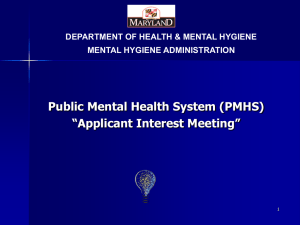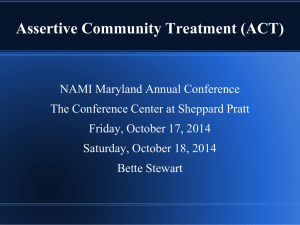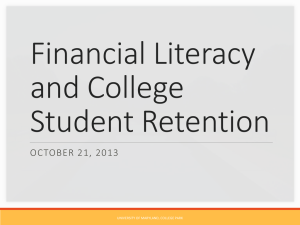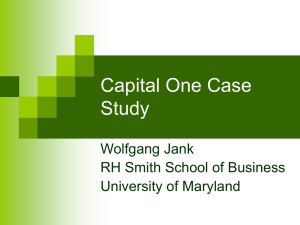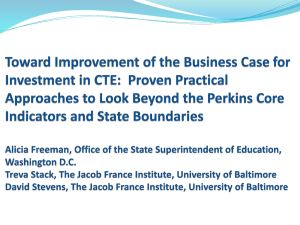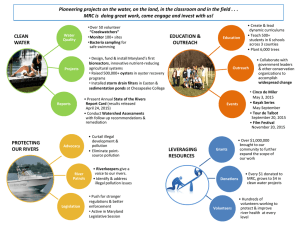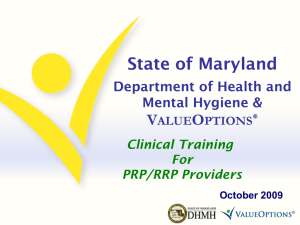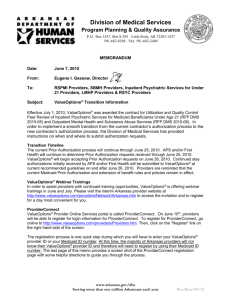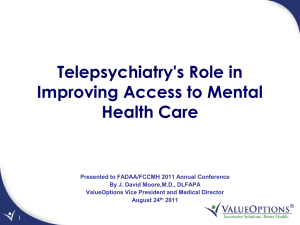Successful Transitioning for Youth with Mental Health Disabilities
advertisement
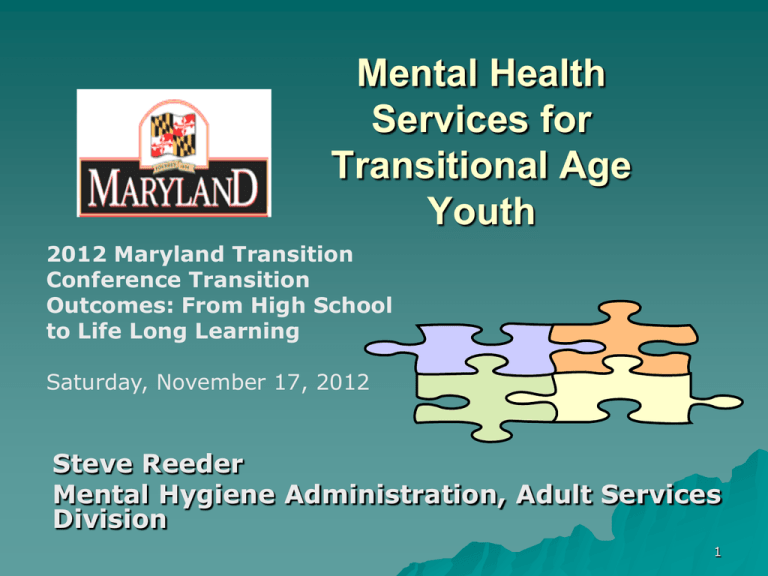
Mental Health Services for Transitional Age Youth 2012 Maryland Transition Conference Transition Outcomes: From High School to Life Long Learning Saturday, November 17, 2012 Steve Reeder Mental Hygiene Administration, Adult Services Division 1 The Good and Bad News: MHA is not DDA Mental health services are not accessed in the same manner that DDA or DORS services are accessed. The Public Mental Health System functions differently – cannot compare systems. 2 Maryland’s current Public Mental Health System (PMHS) 1115 MA managed care waiver which combines state general funds and Medicaid under a single payor system. Mental health is carved out from substance abuse and somatic care services under the auspices of an Administrative Services Organization (ASO). Services are provided through a fee-for-service system by approved providers. 3 Maryland’s PMHS: Roles and Responsibilities Mental Hygiene Administration (MHA) is the state mental health authority responsible for the design and delivery of public mental health services. Core Service Agencies (CSAs), local mental health authorities, have the authority and responsibility to develop and manage a coordinated network of Maryland’s public mental health services in a defined local service area. 4 Core Service Agencies (CSAs) Wicomico and Somerset Regional CSA 19 CSAs covering all 24 jurisdictions http://www.dhmh.state.md.us/mha/Miscellan eous/csa/MACSA%20Directory.pdf 5 CSAs (continued) Core Service Agencies provide services and resources to consumers and families that are not otherwise available through the fee-for service Public Mental Health System (PMHS) training and education; peer support and advocacy; family support and advocacy; specialized services for Transitional Age Youth (TAY) (in 12 jurisdictions) 6 Administrative Services Organization (ASO) Under contract with MHA, the ASO authorizes services and provides utilization management, management information, claims processing, and evaluation services. http://maryland.valueoptions.com You may contact ValueOptions® Maryland at the following toll-free numbers: Call: 800-888-1965 TTY: 866-835-2755 7 Organizational Chart Medicaid Maryland DHMH MHA ASO DDA CSAs OHCQ ADAA ADAA=Alcohol & Drug Abuse Administration DHMH=Department of Health & Mental Hygiene DDA =Developmental Disabilities Administration OHCQ=Office of Health Care Quality 8 PMHS Eligibility The adult Medicaid population is eligible for all services within the ‘benefits package’ if they meet medical necessity criteria for that level of service. The Medicaid-ineligible individuals are eligible for all services, except inpatient, partial hospitalization, and emergency room services, if funding is available, the individual meets medical necessity criteria for that level of service, and the individual meets any specific eligibility requirements such as: 9 Eligibility Requirements for the MA-Ineligible Individual The consumer requires treatment for a DSM IV TR mental health diagnosis(es) covered by the PMHS, AND The consumer has a verifiable Social Security #, AND The consumer has applied for Medical Assistance (MA), Social Security Insurance (SSI), or Social Security Disability Insurance (SSDI). AND… 10 Eligibility Requirements for the MAIneligible Individual (continued) One of the following: The consumer meets the financial criteria [200% of the Federal Poverty Level (FPL).]; OR has received services in the PMHS within the past two years; OR has SSDI due to a psychiatric impairment; OR 11 Eligibility Requirements for the MAIneligible Individual (continued) Is on conditional release from a Maryland state hospital; OR Recently released from a Maryland psychiatric hospital, jail, or prison within the last three months. 12 Public Mental Health Service Benefits package includes: Psychiatric inpatient care Psychiatric day treatment (partial hospitalization) Residential Treatment Respite Outpatient mental health clinic Individual mental health practitioner services Psychiatric Rehabilitation (PRP) Residential Rehabilitation (RRP) Mobile Treatment Services Supported Living Services Supported Employment (SE) Case Management Services Residential Crisis Services Mental Health related laboratory services 13 Service Pre-Authorization ValueOptions® of Maryland or the local Core Service Agency (CSA) can help you find a provider. The provider selected will request authorization for services on behalf of the consumer. ValueOptions® of Maryland staff confirms that the request is based on the consumer’s goals and needs. and that the consumer was involved in the decision. We ValueOptions® also ensures that the services requested meet established medical necessity attendant to the level of service. 14 Service Pre-Authorization In most cases, ValueOptions® of Maryland authorizes the services to be provided. The CSA authorizes SE. If services are not authorized, ValueOptions® of Maryland will work with the consumer and the provider to find a service that best meets the consumer’s goals and needs. 15 Service Pre-Authorization The consumer and/or the provider can ask questions or complain. In addition, the consumer and/or provider can also file an appeal if the consumer’s needs are not met. 16 Policy Application to Youth and Young Adults with Mental Health Conditions SE is available and accessible to youth at age 16 or two years before graduation. Best predictor of post-school success is paid competitive employment prior to graduation from high school (mitigates against drop-out) Evidence Based Practice (EBP) Supported Employment (SE) Maryland was one of three states to implement SE as part of the National Implementing Evidence Based Practices Project, sponsored by the New Hampshire-Dartmouth Psychiatric Research Center and the Substance Abuse and Mental Health Services Administration (SAMHSA). 18 Evidence Based Practice (EBP) Supported Employment (SE) Joint MHA/DORS application for funding to Johnson & Johnson Foundation for Dartmouth Community Mental Health Program in SE. in 2002. 19 EBP SE Access and Availability 20 Evidence-Based Supported Employment Outcomes Consistent rates of 50%-70% competitive employment for consumers in supported employment programs which achieve high fidelity. DORS closure rates average 65% (two to one advantage of EBP versus non-EBP, though gap improving due to overall increase in service quality and system improvements.) 21 Contact Information Steven A. Reeder, M.Ed., CPRP, CRC Chief, Evidence-Based Practice Services and Program Evaluation Maryland Department of Health and Mental Hygiene Mental Hygiene Administration Spring Grove Hospital Center, Mitchell Building 55 Wade Avenue, Catonsville, MD 21228 Phone: 410-402-8476 Fax: 410-402-8304 E-mail: sreeder@dhmh.state.md.us 22


